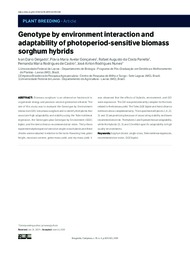Genotype by environment interaction and adaptability of photoperiod-sensitive biomass sorghum hybrids.
Genotype by environment interaction and adaptability of photoperiod-sensitive biomass sorghum hybrids.
Autoria: DELGADO, I. D.; GONÇALVES, F. M. A.; PARRELLA, R. A. da C.; CASTRO, F. M. R. de; NUNES, J. A. R.
Resumo: Biomass sorghum is an alternative feedstock to cogenerate energy and produce second-generation ethanol. The aim of this study was to evaluate the Genotype by Environment Interaction (GEI) in biomass sorghum and to identify the hybrids that associate high adaptability and stability using the Toler nonlinear regression, the Genotypes plus Genotype by Environment (GGE) biplot, and the Annicchiarico recommendation index. Thirty-three experimental photoperiod-sensitive single-cross hybrids and three checks were evaluated in relation to the traits: flowering time, plant height, moisture content, green mass yield, and dry mass yield. It was observed that the effects of hybrids, environment, and GEI were expressive. The GEI was predominantly complex for the traits related to the biomass yield. The Toler, GGE biplot and Annicchiarico methods show complementarity. The experimental hybrids 1, 8, 22, 31 and 33 are promising because of associating stability and lower recommendation risk. The hybrids 1 and 8 present broad adaptability, while the hybrids 22, 31 and 33 exhibit specific adaptability to high quality environments.
Ano de publicação: 2019
Tipo de publicação: Artigo de periódico
Unidade: Embrapa Milho e Sorgo
Palavras-chave: Biomassa, Biplot GGE, Cruz simples, Regressão não linear de Toler, Sorgo
Observações
1 - Por padrão são exibidas publicações dos últimos 20 anos. Para encontrar publicações mais antigas, configure o filtro ano de publicação, colocando o ano a partir do qual você deseja encontrar publicações. O filtro está na coluna da esquerda na busca acima.
2 - Para ler algumas publicações da Embrapa (apenas as que estão em formato ePub), é necessário ter, no celular ou computador, um desses softwares gratuitos. Sistemas Android: Google Play Livros; IOS: iBooks; Windows e Linux: software Calibre.
Acesse outras publicações
Acesse a Base de Dados da Pesquisa Agropecuária (BDPA) para consultar o acervo completo das bibliotecas da Embrapa.

